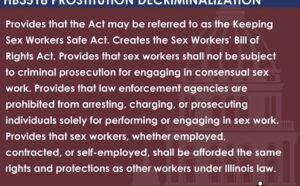OP/ED by Tyler Dawson, Ottawa Citizen
Police activity and calls for regulation in the past week provide a glimpse into the future of what sex work could look like, following the upcoming Canadian Supreme Court ruling on prostitution this Friday.
In Montreal, there is talk of a regulatory crackdown on massage parlours that offer sexual services. In Ottawa, police went on one of their “john sweeps,” where they arrest those searching for sexual services.
It smacks of a last-ditch effort to cause as many problems as possible for those working in the sex trade before the court rules. It also suggests that even once the ruling has been made — regardless of the outcome — there may be regulatory hurdles that sex workers will need to overcome if they want to work legally.
Licensing regimes, for example, could create major headaches for brothel operators. There could also be zoning issues that make it difficult for both street-based workers and those working indoors to establish businesses.
These challenges could cause problems: they could be too onerous and parts of the industry might just decide to stay underground to avoid the trouble of dealing with municipal governments. As sex workers themselves have pointed out, restrictive regulation could lead to large brothels where the workers themselves have little control over management.
However, these are hurdles that can be overcome, assuming politicians care enough to actually make things safe and legal for sex workers — though that’s a rather large assumption to make.
Keep reading…
Tyler Dawson on Twitter








 TrafficHolder.com - Buy & Sell Adult Traffic
TrafficHolder.com - Buy & Sell Adult Traffic
And this is why I favor decriminalization over regulated legalization. The regulations are useless and ineffective and just provide LE with new excuses to hassle sex workers.
Agreed. Registration schemes don’t have a very pleasant history.
[…] Op-Ed: The Canadian Supreme Court and Sex Workers […]